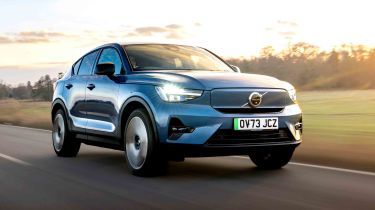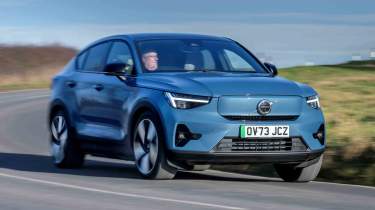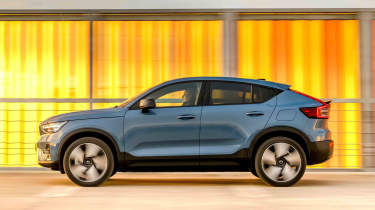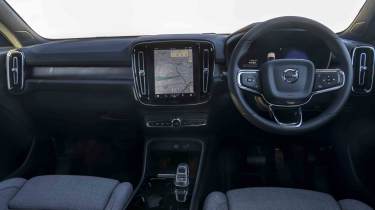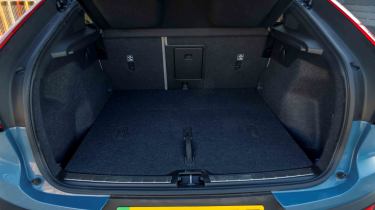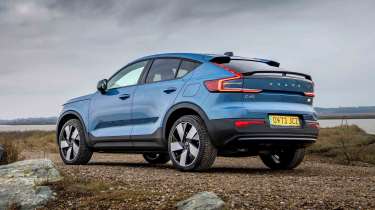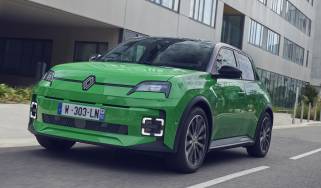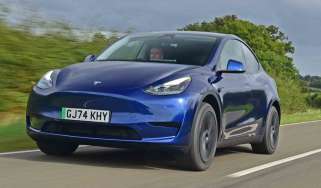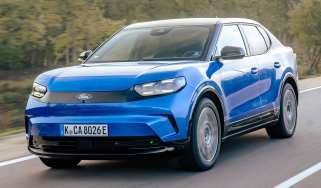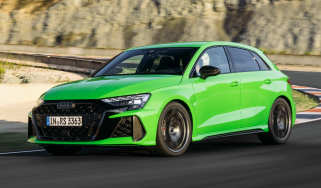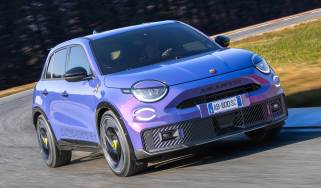Volvo EC40 review
Stylish Volvo EC40 SUV delivers strong performance and decent range, but it comes at a cost
Is the Volvo EC40 a good car?
The Volvo EC40 (previously known as Volvo C40) is a smart, stylish and easy to live with electric SUV, but it is a car with a bit of an identity crisis. The almost identical Volvo EX40 delivers a similar design and performance but with much greater practicality, while the closely related Polestar 2 is more engaging to drive.
On the plus side, the Volvo has a wide range of motor and battery options, plus a decent range and an interior that’s classy and comfortable. Better still, it now costs the same as the EX40, so if you do want to sacrifice a little space for some style you’re no longer paying more for less practicality.
|
Key specs | |
|
Fuel type |
Electric |
|
Body style |
Coupe crossover |
|
Powertrain |
69kWh battery, 1x e-motor 235bhp, rear-wheel drive |
|
Safety |
5-star Euro NCAP (2022) |
|
Warranty |
3yrs/60,000 miles |
How much does the Volvo EC40 cost?
Effectively a more stylish version of the Volvo EX40, the EC40 is a fully electric compact coupe crossover. Prices start at around £45,000, rising to just short of £64,000 for the top-of-the-range models.
There’s a choice of rear-wheel drive Single Motor and Single Motor Extended Range, along with four-wheel drive Twin Motor and Twin Motor Performance powertrain layouts, while battery options include 69kWh, 78kWh and 82kWh, depending on the model.
The core trim levels for the EC40 are Plus and Ultra, but there are also sportier-looking Black Edition versions of both these trims. These come exclusively in Onyx black paint, and feature gloss black exterior trim details and alloy wheels, plus black suede trim inside. If you opt for a Twin Motor in Black Edition form, you automatically get the Twin Motor Performance powertrain, giving you 436bhp compared with the standard 402bhp Twin Motor.
More reviews
All versions of the EC40 come well-equipped, with 19-inch wheels, front and rear parking sensors along with a reversing camera, a powered tailgate, auto-folding door mirrors, adaptive cruise control, dual-zone climate control, an efficient heat pump, heated seats front and rear, a 12.3-inch digital instrument panel and nine-inch touchscreen, plus Apple CarPlay and Android Auto smartphone connectivity. The plushest Ultra trim brings a 13-speaker Harman Kardon stereo system, panoramic sunroof, adaptive Pixel LED headlights, and a 360-degree camera system.
Originally launched in 2021 as the C40, it was renamed the EC40 in 2024 to bring it into line with the rest of the model range. Curiously, the car received a subtle facelift in 2023 that resulted in the Single Motor models being re-engineered from a front-motor, front-wheel drive design to a rear motor, rear-wheel drive layout. These changes were designed to improve efficiency and packaging.
Engines, performance & drive
Underneath, the EC40 is essentially the same as the EX40, which means it drives in much the same way. You also get the same choice of rear-wheel drive Single Motor and all-wheel drive Twin Motor set-ups, with the latter serving up an incredible 436bhp in Twin Motor Performance guise for genuine sportscar slaying pace.
The 0-62mph time is 4.7 seconds (4.6 seconds in Twin Motor Performance guise), which sounds quick enough, but if anything, the EC40 feels even faster than this figure would suggest. This is partly down to the instant torque delivery of the electric motors - which isn’t softened off here, as is the case for a lot of EVs now - but also because the performance seems somewhat unexpected in a car that looks like this.
If you’re after something a little more sedate, then the Single Motor models will be just the ticket, although, with a choice of either 235bhp or 249bhp outputs, neither is a slouch. The former comes with a lighter 69kWh battery, while the latter gets more power to counteract its heavier 78kWh pack. This helps to explain why both can sprint from 0-62mph in 7.3 seconds. In reality, the Single Motor is quick enough for most situations, stepping off smartly from the line and with enough high-speed acceleration for swift and safe overtaking.
Like the EX40, the EC40 sits on the Swedish brand’s Compact Modular Architecture (CMA) underpinnings, which uses MacPherson strut suspension at the front and a multi-link rear axle. As a result, the Volvo handles with surprising assurance and poise, even if it can’t match the closely related Polestar 2 for dynamic sparkle. Overall, it performs with surprising agility for what is a tall SUV.
On the plus side, the steering is nicely weighted and pleasingly direct, while the well-judged chassis set-up and a decent amount of grip mean that you’ll have confidence tackling a twisty back road. The EC40 also strikes a nice balance between composure and comfort, and while it can get caught out on pockmarked and potholed city streets, the Volvo is a relaxing companion. It’s at its best on smaller 19-inch wheels, which cope better with rough surfaces than the larger 20-inch rims.
The Volvo delivers impressive refinement, whichever wheel size you choose, because wind, road, and suspension noise are all well suppressed. Factor in the commanding driving position and excellent seats, and the EC40 makes a fine long-distance cruiser.
|
Model |
Power |
0-62mph |
Top speed |
|
EC40 Single Motor Plus 69kWh |
235bhp |
7.3 secs |
112mph |
|
EC40 Single Motor Extended Range Plus 78kWh |
249bhp |
7.3 secs |
112mph |
|
EC40 Twin Motor Ultra 82kWh |
402bhp |
4.7 secs |
112mph |
|
EC40 Twin Motor Performance Ultra 82kWh |
436bhp |
4.6 secs |
112mph |
Range, charging & running costs
Thanks to a range of updates in 2023, the Volvo benefitted from a range of technical tweaks that helped lift its range from below par to class competitive. As a result, the EC40 now has a range of up to 345 miles (278 miles previously), which is a match for rivals such as the BMW iX2 and Volkswagen ID.4.
However, you’ll need to fork out for the Single Motor Extended Range with the 78kWh battery to achieve that figure between charges, because the standard Single Motor EC40 gets up to 300 miles from a smaller 69kWh battery. The extra performance and weight of the Twin Motor versions means the range is pegged back to a claimed 335 miles, despite getting an even larger 82kWh battery.
The Twin Motor, 82kWh battery EC40 is capable of fast-charging at a rate of up to 200kW, resulting in a 10 to 80% top-up for a suitably rapid charger taking as little as 28 minutes. However, the single-motor models use a smaller 69kWh battery from a different supplier, with a reduction in charging capacity to 130kW and a 34-minute wait for the same amount of charge. Utilising a 7.4 kW home wallbox charger will take 11 hours to fully charge the 69kWh Single Motor, 12 hours for a Single Motor Extended Range, and 13 hours for the 82kWh Twin Motor.
As you’d expect, the EC40’s zero emissions make it a great choice for business users, as its Benefit-in-Kind (BiK) rating is just two per cent. That means a higher-rate taxpayer can expect a salary sacrifice of just £420 on an entry-level Single Motor model.
According to our expert data, EC40 owners can expect their cars to retain between 41 to 43 per cent of their new value after a typical ownership period of three years or 36,000 miles. The Single Motor Extended Range Plus performs the best, while the Twin Motor Performance Ultra sheds the most value.
|
Model |
Battery size |
Range |
Insurance group |
|
EC40 Single Motor Plus 69kWh |
69kWh |
300 miles |
35E |
|
EC40 Single Motor Extended Range Plus 78kWh |
78kWh |
345 miles |
36E |
|
EC40 Twin Motor Ultra 82kWh |
82kWh |
335 miles |
40E |
Design, interior & technology
Essentially a coupe-inspired version of the EX40, the EC40 takes many design cues from its more rugged and practical sibling. The result is lots of simple, clean, resolved lines – managing to look chunky and sleek at the same time.
From the nose, complete with Volvo’s trademark ‘Thor’s Hammer’ headlight design, through to the windscreen, the EC40 is identical to the EX40. It also shares that car’s SUV-inspired raised ride height and tough body cladding. However, with its swooping roofline and rakish tailgate complete with a small spoiler, the EC40 has more kerb appeal.
While the EC40 still looks striking and modern on the outside, the interior is starting to feel its age a little. It’s well-built and has plenty of high-grade materials, but compared to the brand’s newer Volvo EX30 and Volvo EX90 models, the EC40’s cabin isn’t quite as fresh.
Still, the design has enough Scandinavian minimalism to keep things interesting, while the uncluttered layout is easy to use. For instance, the EC40 gets the same nine-inch portrait-layout infotainment display as the Volvo XC60 and Volvo XC90, and a 12.3-inch digital instrument panel instead of conventional dials. The latter looks good and can be customised to display a map at the touch of a button, which is useful when following sat-nav instructions.
You’re not short of toys either, with even entry-level models getting heated front and rear seats, climate control, a surround-view camera and an eight-speaker hi-fi system. There are numerous customisation options, including the availability of tailored wool trim for the seats. In keeping with Volvo’s keen eco-credentials, there is no leather option.
Sat-nav, stereo and infotainment
Given that the EC40’s interior is carried over from the EX40, it’s no surprise to find it uses the same infotainment system. This means you get a nine-inch portrait-oriented central touchscreen running an Android-based operating system with built-in online Google services. The graphics are crisp, and the shortcut keys are bolder and less fiddly to use than previous Volvo setups.
Better still, the screen’s loading times are good, even if it took a while to bring up an address for the sat-nav. There’s also the ‘Okay Google’ voice assistant, which responds fairly well to your prompts, even if it isn’t as effective as the ‘Hey Mercedes’ set-up used in the Mercedes EQA.
Volvo has stuck with a physical home button below the touchscreen, plus there’s a large volume dial and a row of buttons, including the hazard warning light and heated rear window. However, the rest of the climate controls and air-con settings are adjusted through the touchscreen, which is a frustration when you’re driving.
While there is smartphone connectivity, you’re encouraged to log into your Google account, along with any of the pre-installed apps you might use, such as Spotify. It’s hard to fault once you’re logged in, but it takes a long time to set up.
There’s wireless phone charging as standard, while the top-of-the-range Ultra comes with a powerful upgraded 600-watt, 13-speaker Harman Kardon sound system that offers excellent sound quality.
Boot space, comfort & practicality
|
Dimensions | |
|
Length |
4,440mm |
|
Width |
1,873mm |
|
Height |
1,591mm |
|
Number of seats |
5 |
|
Boot space |
404-1,196-litres |
Although the EC40 is billed as a coupe, it’s not much less practical than the standard EX40. There’s a fraction less headroom in the rear and a slightly smaller boot, but overall, the Volvo will do sterling service as a family car.
Like the EX40, the EC40 is a full five-seater, although fitting three adults across the rear bench is a squeeze. There’s decent legroom in the rear, while only the tallest occupants will feel short-changed due to that rakish roofline. Those sitting in the middle seat will have their legs straddling a small ‘transmission’ tunnel, but they will get the full effect of the separate heating vents that sit between the front seats.
Speaking of which, those sitting up front get plenty of head and legroom, while the well laid-out driving position offers a fine view of the road ahead. Moreover, like all Volvo models, the EC40’s electrically powered seats are some of the best in the business, with exceptional support and a wide range of adjustments.
There are plenty of handy design features and storage options, too. For example, the glove box features a folding hook that is designed to help you make it home without spilling any of your shopping or takeaway. Then there’s the rather flimsy-looking lidded compartment between the front seats that’s actually a removable (for washing) waste bin. A wireless phone charging pad and USB port can be found at the base of the centre console.
Where you’re most likely to notice the EC40’s coupe conversion is in the boot, where capacity shrinks to 404-litres from the EX40’s 452-litres. That’s still a fairly sizeable carrying capacity, while the load area is well-shaped and free of intrusions. Better still, the boot floor contains a load divider, revealing three handy shopping hooks when raised. The hatchback opening of the EC40 is large, and there’s no load lip to lift items over. The 60/40 split-fold rear seat liberates 1,196-litres of space when folded.
Like many EVs, the EC40 also features a ‘frunk’ at the front of the car, which has enough room for a large squashy bag. It also provides a handy place to store the car’s charging cable when not in use.
The EC40 also steals a march on rivals when it comes to towing. Many EV models aren’t rated for a tow bar, while those that are can have very low weight limits. However, the Volvo is capable of pulling a braked trailer or caravan of up to 1,800kg in Twin Motor and Twin Motor Performance guises, which is higher than many ICE SUVs. The standard Single Motor and Single Motor Extended Range versions can still lug around a highly creditable 1,500kg trailer or caravan.
Safety & reliability
With a strong reputation for safety, it’s no surprise to find that the Volvo is a reassuring family car choice. When Euro NCAP tested it under its old C40 guise in 2022, the EC40 scored the maximum five-star score, with an impressive 92% rating for adult occupant protection. There’s also a wide range of driver assistance systems, including lane-keeping assist, blind-spot monitoring, an alert that warns you if anything is crossing behind you when you reverse, and autonomous emergency braking that can detect vehicles, pedestrians, cyclists and large animals.
The EC40 hasn’t appeared in our Driver Power owner satisfaction survey, but the closely related XC40 has. It came in 32nd place out of 50 models in our 2024 poll, which is a bit of a drop from an excellent eighth-place finish out of 75 cars three years prior in 2021. The Volvo scored an eighth-place finish out of 32 manufacturers, and while 28% of owners reported experiencing faults in the first year, they were particularly complimentary about the car’s interior and safety features.
Like all Volvo models, the EC40 is covered by the brand’s standard three-year or 60,000-mile warranty, while the battery components are covered by a separate eight-year or 100,000-mile guarantee.
|
Key standard safety features |
Euro NCAP safety ratings |
|
|
Volvo EC40 alternatives
The growth in the EV premium compact SUV market means the EC40 isn’t short of rivals. Like the Volvo, the BMW iX2 is a coupe version of a standard SUV, in this case the iX1. It’s not quite as smartly styled as its Swedish competitor, but the BMW is sharper to drive, slightly roomier and packed with more advanced tech.
It’s slightly smaller than the Volvo and undercuts it on the price, but the Lexus UX300e offers a similarly upmarket vibe with a dash of eye-catching style. And while its 279-mile range trails the EC40’s, the Japanese machine is beautifully built and has an unrivalled reputation for reliability.
Also worth considering is the Mercedes EQA, which, like the EC40, is available in both single and dual motor guises. It’s also luxuriously appointed and dripping in the brand’s trademark infotainment and safety technology.
Frequently Asked Questions
In our 2024 Driver Power survey, the Volvo brand came eighth out of 32 brands, suggesting that owners have strong satisfaction with their cars
